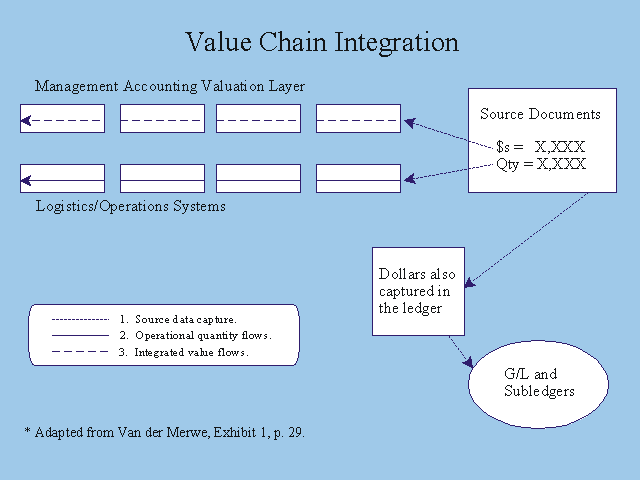
Summary by James R. Martin, Ph.D., CMA
Professor Emeritus, University of South Florida
Controversial Issues Main Page |
Cost Management Main Page
In the previous article1 Van der Merwe argued that the current state of management accounting is contradictory, confusing, and often absurd. The purpose of this paper is to establish the principles that will serve as the cornerstones for the restoration of management accounting, and to demonstrate how they are integrated into an existing management accounting framework. This integration will serve to highlight the required adjustments to the framework and to validate the cornerstones' implementation feasibility. In part III 2 Van der Merwe recommends an evaluation framework to critically evaluate some of the assertions related to the prevailing approaches to management accounting.
Two principles from inductive logic that provide the basis for drawing cause and effect inferences are presented as the cornerstones of management accounting. These include: 1) causality and 2) analogy.
Causality
Causality is recognized in philosophy as a first principle, i.e., a principle that is self evident. It embodies the law of rational inference and is a universal principle in inductive logic. Although the traditional management accounting definition of causality relates to value as stated in dollars, managers need both a quantitative model of operating cause and effect relationships as well as a value representation of those relationships. Therefore the definition of causality that is needed here is a correspondence definition (i.e., corresponding to the facts), or a definition related to the quantities of the goods and services produced by the enterprise, i.e., the real things. The dual nature of the information produced for management is illustrated in the value chain integration graphic presented below.

The illustration above shows that the quantities of inputs and outputs are never separated from their values as in traditional management accounting systems. The integrity of quantity-value is maintained which allows management accounting to support the general ledger, but at the same time to become independent of the general ledger. The correspondence definition of causality and the value chain integration enhances management accounting's usefulness, separates it from external reporting, lowers the cost of sound management accounting information, and renders the method centric approaches to management accounting obsolete.
Analogy
Analogy is the second cornerstone proposed by Van der Merwe and is related to making inferences based on known cause and effect relationships. Analogy involves the application of causal information and is used in management accounting to help analyze and understand financial results and to make inferences related to future events.
Integration of the Cornerstones into the Existing Management Accounting Framework
Van der Merwe begins with Shillinglaw's management accounting framework 3 that includes concepts, criteria, and constraints (See the graphic below).

Concepts include cost, cost objective, and variability. Criteria refers to elements such as the two proposed cornerstones, i.e., causality and analogy. Shillinglaw's original framework includes causality. Constraints include what Van der Merwe refers to as filters such as objectivity, accuracy, and materiality. His revised framework is illustrated below.

The revised framework goes beyond product costing for external reporting and allows for greater levels of detail. Analogy serves to limit the detail to what is required for enterprise optimization. Under concepts, the new framework excludes variability (traditionally the relationship between total volume and total cost), and adds responsiveness. According to Van der Merwe, responsiveness relates to the relationship between input quantities and output quantities. Under constraints, articulation is amended to apply only to the extent that management accounting is required for external reporting. This is accomplished through a separate financial accounting valuation layer as indicated in Exhibit 1, i.e., the first graphic illustration above.
Conclusion
The cornerstones proposed in this paper are philosophically sound, customer-centric, seamlessly integrate into the existing management accounting framework, provide a framework for enterprise optimization and the restoration of management accounting.
_______________________________________________
References:
1 Van der Merwe, A. 2007. Management accounting philosophy I: Gaping holes in our foundation. Cost Management (May/June): 5-11. (Summary).
2 Van der Merwe, A. 2007. Management accounting philosophy III: The management accounting evaluation framework. Cost Management (November/December): 20-29. (Summary).
3 Shillinglaw, G. 1979. Cost accounting principles for external reporting: A conceptual framework. Essays to William A. Paton: Pioneer Accounting Theorist. Edited by S. Zeff, J. Demski and N. Dopuch. Graduate School of Business Administration, University of Michigan.
Other related summaries:
Appelbaum, D., A. Kogan and M. A. Vasarhelyi. 2017. An introduction to data analysis for auditors and accountants. The CPA Journal (February): 32-37. (Summary).
Appelbaum, D., A. Kogan, M. Vasarhelyi and Z. Yan. 2017. Impact of business analytics and enterprise systems on managerial accounting. International Journal of Accounting Information Systems (25): 29-44. (Summary).
Birnberg, J. G. 1992. Managerial accounting: Yet another retrospective. Advances in Management Accounting (1): 1-19. (Summary).
Covaleski, M. and M. Aiken. 1986. Accounting theories of organizations: Some preliminary considerations. Accounting, Organizations and Society 11(4-5): 297-319. (Summary).
Flamholtz, E. G. 1992. Relevance regained: Management accounting - Past, present and future. Advances in Management Accounting (1): 21-34. (Summary).
Horngren, C. T. 1989. Cost and management accounting: Yesterday, and today. Journal of Management Accounting Research (1): 21-32. (Summary).
Macy, G. and V. Arunachalam 1995. Management accounting systems and contingency theory: In Search of effective systems. Advances in Management Accounting (4): 63-86. (Summary).
Shillinglaw, G. 1989. Managerial cost accounting: Present and future. Journal of Management Accounting Research (1): 33-46. (Summary).
Tiessen, P. and J. H. Waterhouse. 1983. Towards a descriptive theory of management accounting. Accounting, Organizations and Society 8(2-3): 251-267. (Summary).
White, L. A., A. Van der Merwe, B. D. Clinton, G. Cokins, C. Thomas, K. Templin and J. Huntzinger. 2012. Conceptual Framework for Managerial Costing: Draft Report of the IMA Managerial Costing Conceptual Framework Task Force. IMA. (Summary).